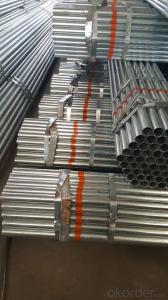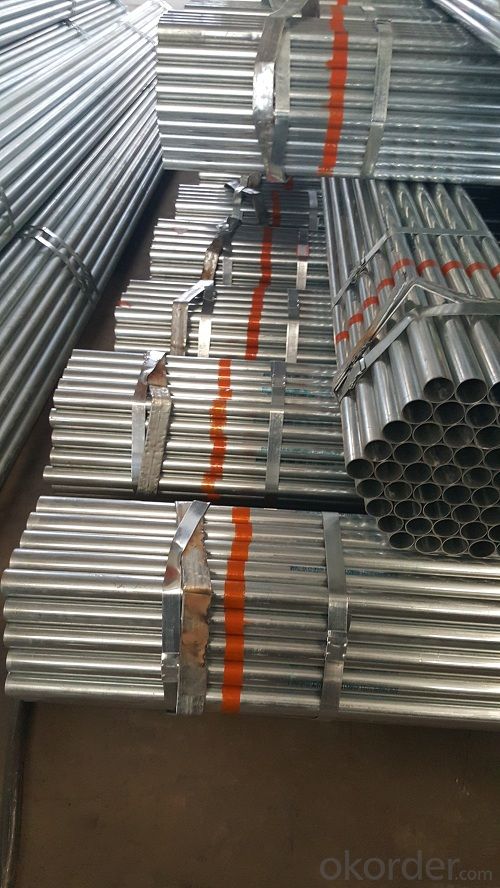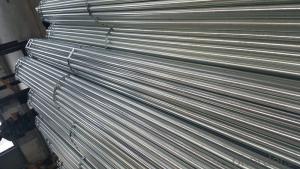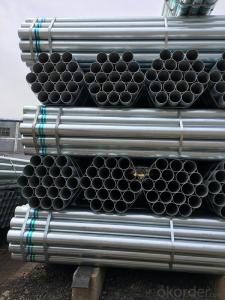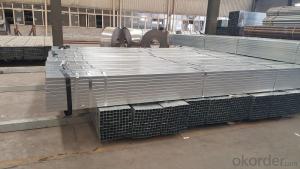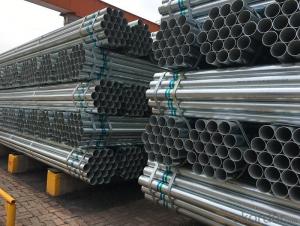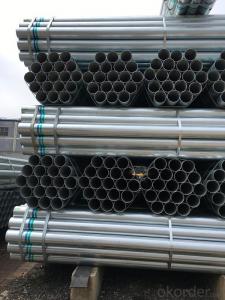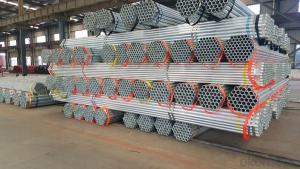Galvanized welded steel pipe for heating pipe
- Loading Port:
- Shanghai
- Payment Terms:
- TT OR LC
- Min Order Qty:
- 10 m.t.
- Supply Capability:
- 12000 m.t./month
OKorder Service Pledge
OKorder Financial Service
You Might Also Like
Specification
1、Structure of Galvanized welded steel pipe for heating pipe:
The surface of galvanized steel pipe welded steel pipe of hot dip galvanized layer or. Galvanized can increase the corrosion resistance of the steel tube, prolong service life. Galvanized pipe is widely used, in addition to water, gas, oil and other general low pressure fluid pipelines. It is also used in the petroleum industry, especially for offshore oil field of oil well pipe and oil pipe, chemical, coking equipment of oil heater, condensation cooler, coal run oil exchanger tube, and trestle pile, the mine tunnel support frame tube.
2、Main Features of Galvanized welded steel pipe for heating pipe:
• High manufacturing accuracy
• High strength
• Good visual effect
• Reasonable price
3、 Galvanized welded steel pipe for heating pipe Specification:
Standard | GB, DIN, ASTM ASTM A106-2006, ASTM A53-2007 |
Grade | 10#-45#, 16Mn 10#, 20#, 45#, 16Mn |
Thickness | 1 - 33 mm |
Section Shape | Round |
Outer Diameter | 21 - 610mm |
Place of Origin | Tianjin, China (Mainland) |
Secondary Or Not | Non-secondary |
Application | Hydraulic Pipe |
Technique | Cold Drawn |
Certification | API |
Surface Treatment | factory state or painted black |
Special Pipe | API Pipe |
Alloy Or Not | Non-alloy |
Length | 5-12M |
Outer Diameter | 21.3-610mm |
Grade | 20#, 45#, Q345, API J55, API K55, API L80, API N80, API P110, A53B |
Standard | ASME, ASTM |
1) Material:Q195 Q235 Q345 X42 X52
2) Specification range:OD:21.3-610mm,WT:6-70mm,length:6-12m or according to the requirement of clients.
3) Excutive standards:GB,ASME API5L.ASTM A 106/A53,Despite of the above standards,we can also supply seamless steel pipe with standard of DIN,JIS,and so on,and also develop new products according to the requirements of our clients!
4) Surface: galvanized.
5) Ends:Beveled or square cut,plastic capped,painted.
6) Packing:bundles wrapped with strong steel strip,seaworthy packing.
4、Packaging & Delivery
Packaging Details: | seaworthy package,bundles wrapped with strong steel strip |
Delivery Detail: | 15-30days after received 30%TT |
5、FAQ of Galvanized welded steel pipe for heating pipe:
①How is the quality of your products?
Our products are manufactured strictly according to national and internaional standard, and we take a test
on every pipe before delivered out. If you want see our quality certifications and all kinds of testing report, please just ask us for it.
Guaranteed: If products’ quality don’t accord to discription as we give or the promise before you place order, we promise 100% refund.
②How about price?
Yes, we are factory and be able to give you lowest price below market one, and we have a policy that “ for saving time and absolutely honest business attitude, we quote as lowest as possible for any customer, and discount can be given according to quantity”,if you like bargain and factory price is not low enough as you think, just don’t waste your time.Please trust the quotation we would give you, it is professional one.
③Why should you chose us?
Chose happens because of quality, then price, We can give you both.Additionally, we can also offer professional products inquiry, products knowledge train(for agents), smooth goods delivery, exellent customer solution proposals.Our service formula: good quality+good price+good service=customer’s trust
SGS test is available, customer inspection before shipping is welcome, third party inspection is no problem.
6、 Galvanized welded steel pipe for heating pipe Images:
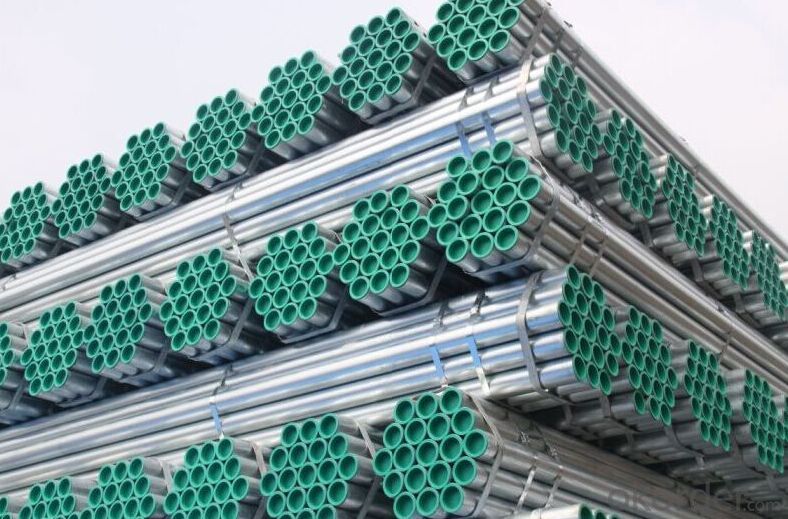
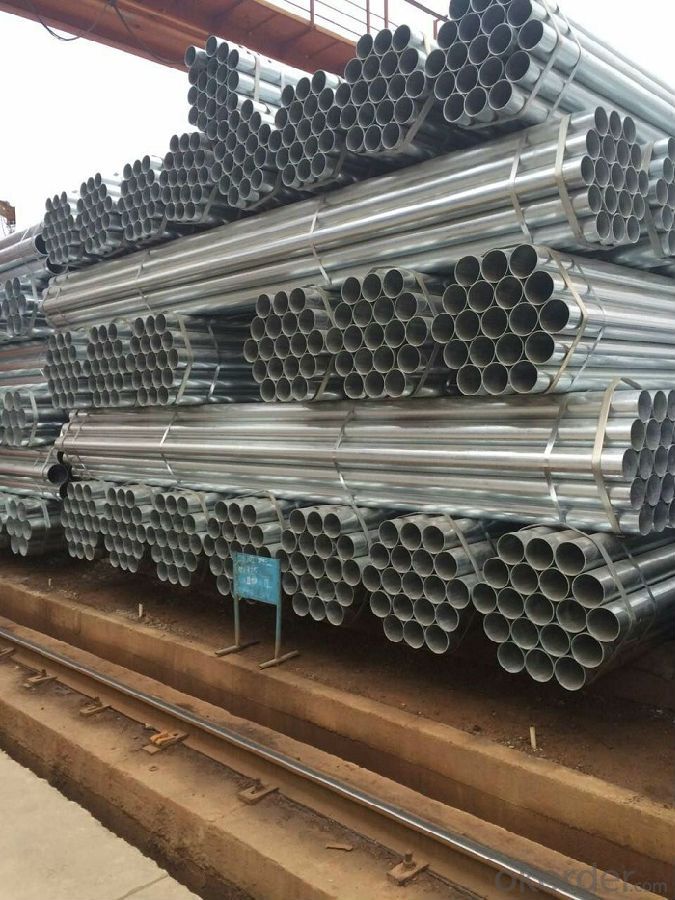
- Q: How do you prevent steel pipes from rusting?
- Various measures can be taken to prevent the rusting of steel pipes. One effective method is the application of a protective coating on the surface of the pipes. Different types of coatings, such as paint, epoxy, or zinc, can be used for this purpose. These coatings act as a barrier between the steel and the corrosive environment, thereby preventing direct contact between moisture, oxygen, and the metal, which can lead to rust formation. Another approach involves the use of corrosion inhibitors. These substances are added to the water or fluid flowing through the pipes, creating a protective film on the surface of the steel. This film acts as a shield, inhibiting the corrosion process and preventing the formation of rust. Regular maintenance plays a crucial role in preventing rust on steel pipes. It is essential to inspect the pipes regularly for any signs of damage or corrosion and promptly repair or replace any compromised areas. Additionally, keeping the pipes clean and dry by removing accumulated dirt or moisture helps prevent the formation of rust. In some cases, using stainless steel pipes instead of regular steel can be beneficial. Stainless steel contains chromium, which forms a passive oxide layer on the metal's surface. This layer acts as a natural barrier against corrosion, making stainless steel pipes highly resistant to rust. Finally, controlling the installation environment of the pipes can also help prevent rust. This can be achieved by maintaining proper ventilation, controlling humidity levels, and avoiding exposure to harsh chemicals or corrosive substances. By implementing these preventive measures, the lifespan and integrity of steel pipes can be significantly extended, while minimizing the risk of rust formation.
- Q: Can steel pipes be used for chemical refineries?
- Yes, steel pipes can be used for chemical refineries. Steel pipes are commonly used in chemical refineries due to their high strength, durability, and resistance to corrosion. The harsh environment of a chemical refinery, which involves exposure to corrosive chemicals and extreme temperatures, requires materials that can withstand these conditions. Steel pipes are able to handle these challenges and are often chosen for their ability to transport various fluids and gases safely and efficiently. Additionally, steel pipes can be welded, which allows for easy installation and maintenance in complex refinery systems. Overall, steel pipes are a suitable choice for chemical refineries due to their robustness, corrosion resistance, and compatibility with the demanding conditions of this industry.
- Q: Can steel pipes be used for swimming pool installations?
- Yes, steel pipes can be used for swimming pool installations. Steel pipes are known for their durability and strength, making them a suitable choice for underground or aboveground swimming pool plumbing systems. They are capable of handling high water pressure and can withstand the corrosive effects of pool chemicals. Additionally, steel pipes are resistant to extreme weather conditions and can be easily installed and maintained. However, it is important to ensure that the steel pipes are properly treated and coated to prevent rust and corrosion.
- Q: Are steel pipes resistant to corrosion?
- Yes, steel pipes are generally resistant to corrosion due to their composition, which includes a protective layer of zinc or other anti-corrosion coatings. However, factors such as exposure to harsh environments or chemicals can affect the level of corrosion resistance.
- Q: Can steel pipes be used for underground fuel pipelines?
- Yes, steel pipes can be used for underground fuel pipelines. Steel pipes are commonly used for various types of pipelines due to their durability, strength, and resistance to corrosion. When it comes to underground fuel pipelines, steel pipes are a popular choice due to their ability to withstand high pressure and temperature fluctuations. Additionally, steel pipes provide excellent protection against external elements, such as soil movement or chemical reactions, ensuring the safety and integrity of the fuel transportation system. Proper insulation and coating can further enhance the corrosion resistance of steel pipes, making them a reliable option for underground fuel pipelines.
- Q: How are steel pipes used in firefighting systems?
- Steel pipes are used in firefighting systems to transport water or other fire-suppressing agents from a water source to the location of a fire. These pipes are durable and resistant to heat, making them suitable for carrying large volumes of water at high pressure to extinguish fires effectively. Additionally, steel pipes are often used for underground or overhead fire hydrant systems, sprinkler installations, and standpipe systems in buildings to ensure a reliable and efficient firefighting infrastructure.
- Q: What is the importance of corrosion resistance in steel pipes?
- Corrosion resistance in steel pipes is crucial as it helps prevent the deterioration of the pipes due to chemical reactions with substances in their surroundings. This resistance ensures the longevity and durability of the pipes, minimizing the risk of leaks, clogs, and structural failures. Additionally, it helps maintain the quality and safety of the transported fluids or gases, preventing contamination or degradation. Overall, corrosion resistance in steel pipes is essential for maintaining efficient and reliable infrastructure systems in various industries such as oil and gas, water supply, and construction.
- Q: Can steel pipes be used for conveying gases?
- Indeed, gases can be conveyed using steel pipes. In different industries, such as oil and gas, petrochemical, and construction, steel pipes are commonly employed to transport a wide range of gases, including natural gas, air, and hydrogen. The use of steel pipes for gas transportation offers numerous benefits. They possess exceptional strength and durability, enabling them to withstand rigorous pressure and temperature conditions. Moreover, steel pipes exhibit remarkable resistance to corrosion, effectively preventing gas leakage and ensuring the safety and dependability of the gas transportation system. Furthermore, their smooth internal surface minimizes frictional resistance, facilitating efficient gas flow. As a result, steel pipes are a reliable and extensively-utilized choice for conveying gases across diverse applications.
- Q: What are the common methods for inspecting the condition of steel pipes?
- Steel pipes can be inspected using a variety of methods to ensure their condition and integrity. These methods aim to identify any issues or defects that could potentially affect the pipes. 1. Visual Inspection: Inspectors thoroughly examine the pipes visually to spot any visible signs of damage such as corrosion, cracks, or leaks. They may employ tools like flashlights, mirrors, or borescopes to reach difficult areas. 2. Ultrasonic Testing: This method utilizes high-frequency sound waves to detect defects within the steel pipes. A transducer emits sound waves, and disruptions or reflections in these waves can indicate potential issues like cracks or thinning of the pipe walls. 3. Magnetic Particle Testing: Primarily used to detect surface cracks or defects, this technique applies a magnetic field to the pipe. Fine iron particles are then applied to the surface, and they accumulate at areas with surface defects, making them clearly visible. 4. Eddy Current Testing: This non-destructive testing method detects surface and near-surface defects in steel pipes. It involves passing an alternating current through a coil, inducing eddy currents in the pipe. Disruptions or changes in these eddy currents can indicate defects like corrosion or cracks. 5. Radiographic Testing: X-rays or gamma rays are used in this method to inspect the internal structure of steel pipes. X-ray film or a digital detector is placed on one side of the pipe, while the X-ray source is positioned on the other side. The rays penetrate the steel, and any irregularities or defects can be identified on the film or through digital imaging. 6. Dye Penetrant Inspection: This technique is employed to detect surface-breaking defects in steel pipes. A dye penetrant is applied to the pipe's surface, and after a specified time, a developer is used to draw out the dye from any defects, making them easily visible. Whether used individually or in combination, these methods provide a comprehensive inspection of steel pipes, ensuring their reliability and safety in industries like oil and gas, construction, and manufacturing.
- Q: How are steel pipes protected against corrosion in marine environments?
- Steel pipes are protected against corrosion in marine environments through various methods, such as applying protective coatings, using sacrificial anodes, employing cathodic protection, and implementing corrosion inhibitors.
Send your message to us
Galvanized welded steel pipe for heating pipe
- Loading Port:
- Shanghai
- Payment Terms:
- TT OR LC
- Min Order Qty:
- 10 m.t.
- Supply Capability:
- 12000 m.t./month
OKorder Service Pledge
OKorder Financial Service
Similar products
Hot products
Hot Searches
Related keywords
